The Philadelphia
Public Ledger
Friday, May 4, 1894
Temple College
The Handsome Auditorium Dedicated Yesterday
Governor Pattison Presides at the Ceremony
Addresses by President Conwell and Charles Emory Smith
AN INSTITUTION OF GREAT RESOURCE
Reunion of Students in the Evening Addressed by Prominent Men
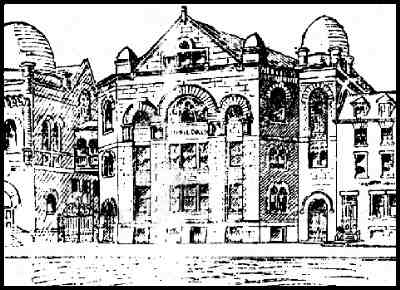
Yesterday was a significant occasion in the history of Temple College. It marked an epoch in the growth of this remarkable institution and the dedication of the College Forum, which ceremony was observed in the auditorium of the Grace Baptist Temple in the presence of 5000 people. Governor Pattison was the presiding officer of the occasion, and the programme was observed in the order of exercises: The invocation was spoken by Rev. William T. Chase, D.D.; the Scriptural reading by Rev. John Gordon, D.D.; the prayer, by Bishop Cyrus D. Foss, D.D., LL.D., and the benediction, by Rev. Frank Lambader, Ph.D., Dean. The Temple College Chorus of 100 voices sang several anthems. David D. Wood officiated at the grand organ, and the music was directed by Theodore E. Perkins.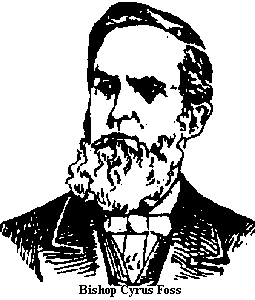
Governor Pattison's Remarks
The introductory remarks were made by Governor Pattison, who, addressing Dr. Conwell and the assemblage, said: "This is a happy day for the people of this college and an occasion of which we can all be proud. Dr. Conwell, the President of this institution, is to be warmly congratulated upon witnessing, in part, the realization of his dreams. Dr. Conwell has conquered the science of waiting, and he knows that all things come to him who knows how to wait. Dr. Conwell is to be congratulated in assembling about him this wonderful organization, and further to be congratulated on knowing how to wait while the people are assembling about him. The members of this college are to be congratulated for the possession of the wonderful power for good which will be shed at home and abroad by this institution.
"People of Philadelphia are to be congratulated for the presence of such an institution. Around and through this noble city institutions have arisen in the cause of education, but I doubt whether any of them will possess a greater influence for good than the Temple College. Until the end of time men will be in pursuit of truth, and knowledge is truth, and every step in that direction is a step towards the realization of truth.
"I see in this noble building the development of opportunity for a broad education. The people in our free government must have the fullest knowledge within them. Permit me to congratulate you, to indulge the hope that the influences shed by this college may be so broad that not only the northern part, but the streets of the southern and the eastern and the western parts of this grand city of Philadelphia may be crowded with people hurrying to institutions like the Temple College, in order that they shall have knowledge and know the truth."
President Conwell Speaks
In a brief speech accompanying the delivery of the keys of the college to Dr. Conwell by Thomas P. Lonsdale, the architect, and their acceptance by the President, Dr. Conwell warmly acknowledged the services of the architect and builder. He reviewed the financial history of the Temple and the college, and said: "We began the building of this Temple with nothing to build it with, and yet were never at a point where we could not pay every cent we owed if the work had been stopped on a day's notice. We trusted in the Lord and in the people who are moved by the spirit of the Lord. There are distributed through this community people who give because they are urges to do so. Dr. Conwell depicted the growth of the departments of the college in a manner that aroused the enthusiasm of the vast assembly, and again alluding to the democratic condition of affairs at the institution said: "There is no distinction, grade, class or aristocracy in this institution, and when I go into this college and I find that the one who studies the hardest and who learns the most is the one who is most respected without regard to the fact that his father is a millionaire or the humblest working man. I am prouder of the fact that such a democratic spirit is abroad in our college than I am of any single feature of this institution, which is just now looking out upon a splendid future."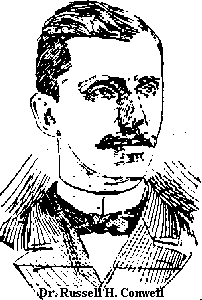
"What we accomplished at this college it is not possible to accomplish in any other city in the country but Philadelphia. We found this college for the purpose of educating the working people who demand that they shall pay for their learning."
Orator of the Day
Charles Emory Smith was the orator of the occasion, and delivered an eloquent address, in the course of which he said: "This bast assemblage of hopeful and ardent youth and of earnest men and women attests the interest and the significance of this occasion. We have gathered in this splendid temple of religion to dedicate a noble kindred edifice consecrated to the sister cause of education. These two sintely structures, standing side by side, under one common inspiration, aptly symbolize the grand truth that religion and education go hand in hand. The speaker referred to a Governor of New York who in a public message not many years ago, opposed higher education, upon the ground that it breeds discontent in the ranks of labor, and leads men to aspire to a position above that in which they are born. If its effect is to stimulate worthy aspiration let it be welcomed.
"What is the secret of the mystic power of this church? What resistless magnet draws these great and undiminished numbers week after week? It is, first of all, the vital force with which the church fulfills its supreme mission of doing the work of the Master. And next to that, it is the broad, living, human interest with which it enters into the needs and hopes and aspirations of daily life. Its strength is it power of ministering, not merely to the spiritual longings, but to the temporal advancement, the associated action, the common sympathies, and the practical good of those who come within its comprehensive fold. Out of this vital spirit sprang the Temple College. The acorn was planted only seven years ago, and to-day we witness the towering oak. The dedication of this imposing building nobly crowns a work which had the smallest beginning, but which has had a wonderful development.
"This is the people's university. It is designed to meet the needs, the opportunities and the possibilities of the mature. It is made flexible and comprehensive to answer the varying wants of the various members. It reaches out to all who have aspirations for higher intellectual development, whether engaged in the daily toil or free for the largest endeavor, and opens before them the golden pathway of knowledge. Not only does it receive the generous youth who have yet to choose the career of life, and aid them in their choice and preparation, but it welcomes the artisan, the mechanic, the clerk, the empowered in whatever sphere, and enlarged their capability of serving themselves and serving this kind of giving them the increased equipment of broader intelligence and training. Temple College recognizes the truth that in every vocation knowledge is power. It acts upon the motto of the artist distinguished for the brilliancy of his coloring, who, when asked with what he mixed his colors, answered that he mixed hem with brains. Every work is better for being mixed with brains, whether it be the study on the easel or the stroke on the anvil. This peculiarly true with the high demands and the boundless opportunities of our age. The avenues open to intellectual activity have been immeasurably multiplied and broadened. The great demand of our time is for the practical in education and in life."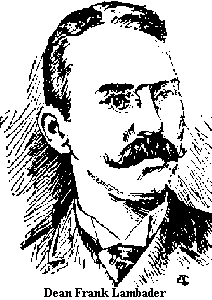
Mr. Smith enforced the lesson that great results were only to be achieved by persistent and patient effort. The college furnished only the tools, and the manner in which they were used was dependent upon the individual. Rightly employed, it would not only greatly increase the equipment for the practical work of life, but it would stimulate a love for that broader culture which adds so much to its enjoyment, The value of a study of literature and history as broadening the mind was dwelt upon, and the speaker closed with a portraiture of the future of the college and its possibilities.
Cost of the Building
The new college building cost upwards of $100,000, and about the middle of the present month the students at present in attendance at the temporary quarters of the Temple College will be transferred to the new building.
About 2000 students are at present enrolled in different departments in the Temple College. Several new departments will be added at the net term. "The Temple College School of Christian Religion," under a separate and distinct faculty is in charge of is in charge of Rev. Forrest E. Dager, D.D., including among its Professors Rev. George Dana Boardman, D.D., Rev. Russell H. Conwell, D.D., Rabbi J. Leonard Levy, Rev. H.I. Wayland, D.D., Rev. William Freemantle, D.D., and possibly Rev. E.P. Armstrong, Ex-Superintendent of the Springfield, Mass., School for Men and Women to do Christian Work.
A department of electricity will also be added at n early date. The Temple College Annex, located at 1726 and 1728 North Broad, will accommodate 1000 students at a time. This has been secured in addition to the new structure about to be dedicated, and is within a half block of the main building, on the west side of Broad street.
Beginning with the next term, there will be located in West Philadelphia, South Philadelphia and Kensington three institutions under the management of the Temple College, which will be known as the West Academy, South Academy and East Academy of the Temple College. The object of these academies is to furnish a practical education, which may be reached by those employed in the day time, at a seasonable hour and without the expense of car fare.
There will be a new gymnasium added, which will be open next week. In connection with the gymnasium an athletic association has been organized, having a ground at Seventeenth and Eric avenue. Cricket, baseball, lawn tennis, croquet and all field sports will be the features which will attract hundreds of young men and women who are now being enrolled as members.
During the next year the new Temple College Building will accommodate 4000 students within its walls, and an additional 2000 will receive instruction in the annex and in the different academies, which makes a total of 6000 students regularly enrolled. This does not include those enrolled in the "Allied Departments," in which men and women received instruction from the professors and teachers. It is estimated that the professors of the Temple College will next year give instruction to more than 10,000 people.
Board of Trustees
The Board of Trustees of the College includes Russell H. Conwell, President; James M. Lingle, Secretary and Business Manager; John Little, Treasurer; D. Edward Moore, Eugene E. Nice, Julian P. Wright, Joseph E. Laine, Jesse Jones, William C. Gath, Charles F. Stone, Richard G. Ocilers and James Auman.
At the close of the services Rev. George A. Peltz announced that John B. Stetson, Charles C. Harrison, Charles H. Cramp, Charles E. Hires and Thomas P. Hunter had each subscribed the sum of $1000 to the College and that Eugene E. Nice had subscribed a like sum upon condition that $10,000 be subscribed. James Johnson, C.J. Miller and Mrs. A. Winters each subscribed $100 and William C. Bennet gave $50.
THE EVENING EXERCISES
District Attorney Graham Presides
Addresses by President Conwell, Secretary Lingle and Rev. Dr. Dager.
District Attorney George S. Graham presided over the evening exercises, which were held in the new college building. The auditorium and class rooms facing the balcony were crowded, a large number of late comers being forced to stand. The platform was bedecked with potted palms, and a stringed orchestra discoursed popular music during the intermissions. Just prior to the opening of the exercises President Conwell arose and proposed three cheers for the new Temple College, which were given with a will. Three more cheers were given for the President of the institution. District Attorney Graham then opened the exercises by introducing the Rev. Dr. Peltz, who offered a prayer.
Chairman Graham's Speech
After a selection by the orchestra, Chairman Graham made an introductory address, "I congratulate you," he said, "upon the accomplishment of such a great and grand work. Your growth has been like the tiny spring. It first flowed into the brook, then to the stream, then to the majestic river. Look back at your beginning, then think of the magnificent present, and in your future I am sure you will be carrying thousands along the mighty river of knowledge. With such strong men of such great minds back of it, the future of this college is assured. Whether we have an interest here or are only visitors we cannot look unmoved on such an institution as this. "There is always a man in every city who towers high above the heads of all others - one whose shoulders are sufficiently broad to carry a gigantic enterprise and with a great mind to maintain it. In this city your President is such a man, and now I ask you to join with me in giving him three rousing cheers." For several minutes the building resounded with the cries of the students, and they ceased only when President Conwell raised his hand for silence.
"Every man knows that the basis of this country depends upon a general dissemination of knowledge, and there is no other basis that will support the superstructure of our social condition. Thousands have already passed through the doors of this college, and this gathering of students bespeaks its untold usefulness. There is nothing outside of religion so important to man as knowledge. The purpose and object of this institution is to develop the thought and help intellectually men and women to a higher plane of influence."
As Mr. Graham concluded President Conwell proposed three cheers for the District Attorney, which were heartily given.
Chairman Graham then arose and said:
The President's Address
"I come to congratulate you on the success of your enterprise," began Dr. Conwell. "I told you once that success is a duty, and you have done your duty well. You have been obligated to meet over stables, in back yards and in cellars: you have been obligated to move about from one place to another, and at almost every hour of the day, and yet through all these gloomy years you appear tonight on the pinnacle of success. You have profited financially by your learning in this college also. Every man should earn as much as he can, and all men, excepting ministers and District Attorneys, are paid according to their worth. Another thing I am thankful for is that you enjoy more of this world now that you have been mentally developed.
"You have reached a point now where there is no need for much future concern about your college. I congratulate you upon your success. Because seven students were successful the first year, 42 were successful the second. During the third year there were 250 and the fourth year 400, and now at the present time there are 3500. Beginning next term there are 6000 students enrolled, which is a mighty force helping themselves.
"Your college and your success, your self-sacrifice and industry, will not die while the world continue. There is one thing, however, that hurts me, and that is that the teachers and officers who have worked unobserved have not been given the credit due them. I have all the credit given me, and I am conscious of receiving the credit that belongs to others."
As President Conwell sat down the building again rang with the cheers of the multitude.
Remarks of Secretary Lingle
Secretary James M. Lingle was introduced and said in part: The Temple College is an antique, a peculiar, a wonderful and a great institution. You are students of a college that was born, nursed, cradled and developed by a kind mother - Grace Church - and with out-stretched arms this structure fondly clasps its mother, while resting upon a foundation more durable than all the wealth and aristocracy and prestige and dignity of all the educational institutions in Christendom. Conceived in faith, reared in hope, maintained in benevolence, this is a great institution." A short address was delivered by Rev. Forrest E. Dager, D.D., after which a general social reunion and inspection of the building was held.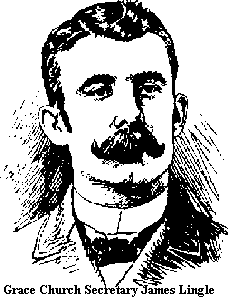
Some of Those Present
Among those who attended the exercises were: Rev. William T. Haines, Thomas B. Longdale, Rev. John Craig, Samuel T. Child, Prof. William Kershaw, Joel Cook, Joseph Fels, Judges Hanna, Rudolph S. Walton, Edward Brooks, Superintendent of the Public Schools; Rev. James Crawford, D.D., Mrs. E. H. Cushing, Baptist Training School; Professor George A. Cliff, E.G. Owrid, Charles H. Dungan, Hon. Robert Adams, Jr., Rudolph Blankenburg, W.A. Ginder, E.A. Merrick, Rev. J.R. Miller, Avery D. Harrington, Rev. W.B. Crowel, H.B. Van Horn, Dr. Tyson, J. Henry Bartlet, Dr. John Marshall, William H. Clark, William C. Guth, Rev. H.F. Reed, Christian G. Gross, Dr. H. Heilman, Thomas Marchment, Joel J. Baily, Rev. Wellington Loucks, Hon. George S. Graham, Receiver of Taxes John Taylor, Sheriff Samuel M. Clement, George Hague, Esq., Mosely H. Williams, Joseph A. Bennett, T.P. Coulston, Professor Adam Geibel, Professor David D. Wood, Daniel H. Reif, Rev. E.B. Palmer, D.D., Albert J. Havens, B.C. Algeo, Rev. Alsop Leffingwells, Professor Silas N. Neff, Rabbi Joseph Krauskopf, Rev. T.A. Fernley, D.D., M.A. Burnam, Edward S. Fits, James H. Windrim, rev. H. Graham, H.H. Hubbert, John I. McDuffee, Irvin T. Geistweit, George W.Mahaffay, Chas. F. Warwick, Rev. Robert Harkinson, Dr. Thomas May Peirce, General Louis Wagner, Hon. John E. Reyburn, Rev. W.T. Chase, D.D., Professor F.E. Schelling, Rev. Charles H. Thomas, Rev. L.Y. Graham, Thomas W.M. Ashman, Josiah Kisterbook, Jr., B.F. Dennisson, Professor H.W. Spangier, Professor Wm. L. Sayre, Professor T.H. McCeal.
This is the WRTI Old Gang Web Site
